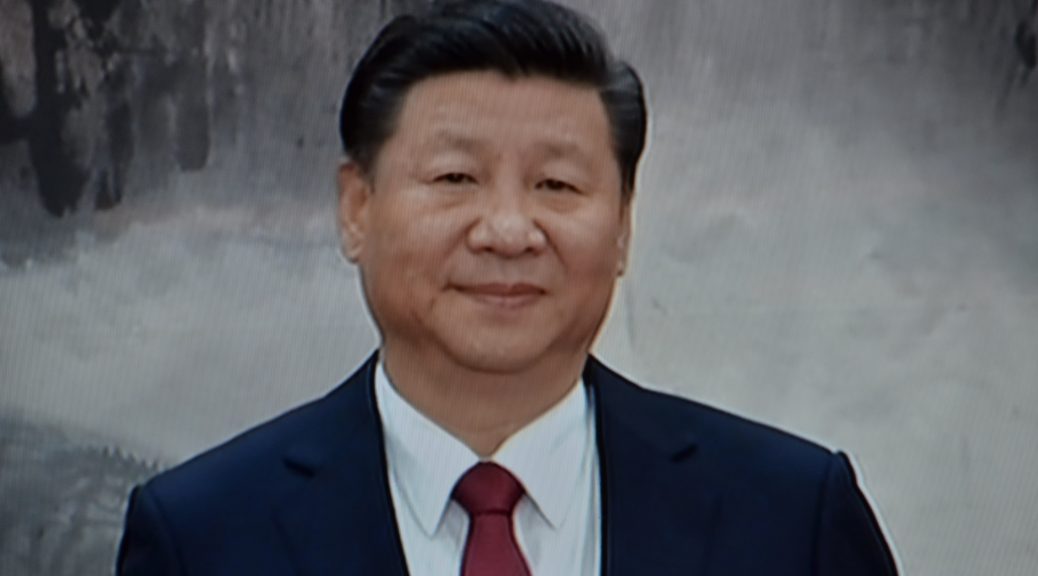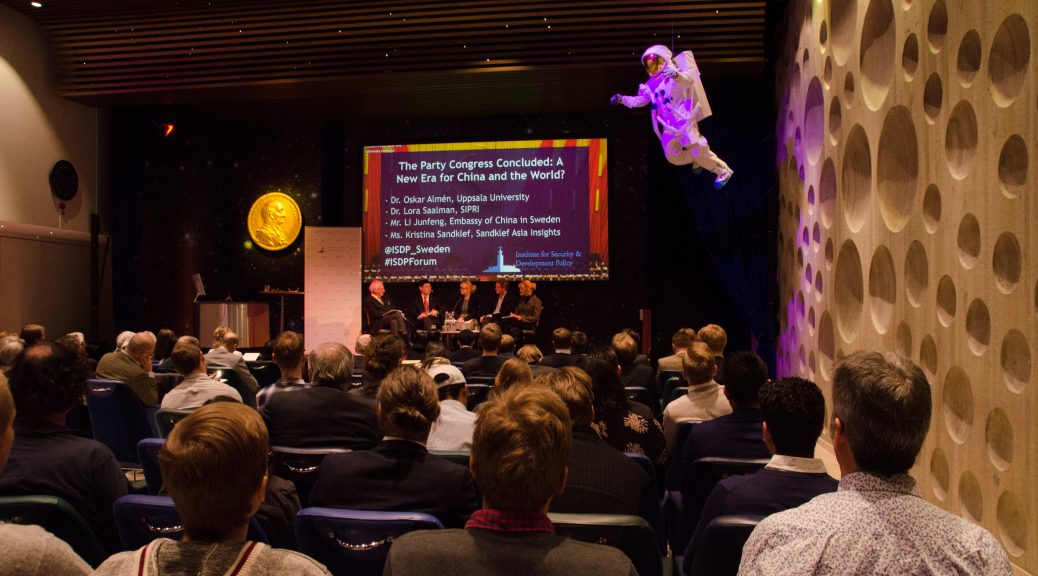By Xuefei Chen Axelsson
STOCKHOLM, Oct. 31(Greenpost)– A craze discussing the 19th CPC Congress has arisen in Sweden beginning with a grand seminar held by Institute of Security and Development Policy.
 Gui Congyou, Chinese Ambassador to Sweden gave a keynote speech at the opening of the seminar.
Gui Congyou, Chinese Ambassador to Sweden gave a keynote speech at the opening of the seminar.
“The successful convening of the 19th CPC congress has arounsed world wide attention. The CPC national congress has analysed the domestic and international situation, made such an important judgement that China’s Socialism with Chinese Characteristics has entered a New Era, elected a new term of leaders of the CPC central committee and mapped out new policies and strategic deployment . It is of great significance for realizing Chinese people’s dreams of a good life and the common development together with the world people, it is a blessing for both the Chinese and world people. ”
Gui Congyou said the Communist Party of China will not forget its mission of leading the Chinese people to live a better life. It’s first goal is to secure a decisive victory in building a moderately prosperous society in all aspects and the second goal is to build a modernized socialist China by 2035.
Gui Congyou said during this process, China has gradually entered the center stage of the world and China will shoulder greater responsibilities for example in peace-keeping forces, in coping with the climate change, anti-terrorism and poverty elimination.
According to the CPC’s goal, in three years, China will completely wipe out the extreme poverty of its 1.3 billion population. Currently the poor is still accounting for 4 percent of the total population or about 40 million which is about four times of the Swedish population.
Gui Congyou said China loves peace and insists on the peaceful coexisting principle and will not interfere in other countries’ domestic affairs. It also opposes interference in other country’s domestic affairs. China will never seek hegemonism. China opposes nuclear proliferation.
Gui Congyou said his mission to Sweden is to make friends and facilitate to deepen bilateral relations between China and Sweden and China will never forget that Sweden was the first western country that established diplomatic relations with China and has always been actively developing relations with China, in which made great contribution to China’s development.
He welcomes Sweden to further cooperation with China in innovation, green economy, energy saving and environmental protection, intelligence manufacturing and many other aspects such as in the United Nations.
He said China under the leadership of the CPC is a builder of the world peace, a contributor of the global development and obeying the world order and rules.
 The host of the seminar was Ambassador Per Eklund who is a board member of the ISDP.
The host of the seminar was Ambassador Per Eklund who is a board member of the ISDP.
 The panalist of the seminar was Li Junfeng, Political Counselor of the Chinese Ambassy to Sweden, Dr. Oskar Alman from Uppsala University, Lora Daalman, director of China and Global Security Program of Stockholm International Peace Research Institute or SIPRI and Dr. Kristina Sandklef, Director of Sandklef Asia Insight.
The panalist of the seminar was Li Junfeng, Political Counselor of the Chinese Ambassy to Sweden, Dr. Oskar Alman from Uppsala University, Lora Daalman, director of China and Global Security Program of Stockholm International Peace Research Institute or SIPRI and Dr. Kristina Sandklef, Director of Sandklef Asia Insight.
 Dr. Alman said he was a little bit worried about the election procedures in China but after the congress he felt not that worried. On the other hand, he also felt the concentration of power might be better for implementing environmental protection policies for example, so it depends on how you look at it and there is a lot of tradeoffs.
Dr. Alman said he was a little bit worried about the election procedures in China but after the congress he felt not that worried. On the other hand, he also felt the concentration of power might be better for implementing environmental protection policies for example, so it depends on how you look at it and there is a lot of tradeoffs.
 Dr. Kristina Sandklef said she held that there will be more cooperation opportunities if China holds its promise of giving the same treatment of foreign enterprises, or as generous as Sweden in giving market access to Chinese companies.
Dr. Kristina Sandklef said she held that there will be more cooperation opportunities if China holds its promise of giving the same treatment of foreign enterprises, or as generous as Sweden in giving market access to Chinese companies.
 Lora Saalman, Director of China and Global Security Program of SIPRI said she noticed China’s strengthening of combat capability and modernization of its weapons, but in general, China’s number of armed forces is not on the increase.
Lora Saalman, Director of China and Global Security Program of SIPRI said she noticed China’s strengthening of combat capability and modernization of its weapons, but in general, China’s number of armed forces is not on the increase.
The panelists also discussed about gender equality issue, election procedures and many other aspects.
In the evening, Stockholm Chinese Assistance Center led By James Wang Jianrong also held a seminar discussing the 19th CPC National Congress.
Meanwhile, in Sveavägen 41 in Stockholm, ABF hosted a seminar on a book titled Mao i Sverige or Mao in Sweden–1963-1986 written by a Phd student Ingrid.
She said she had lived in China for a few years and spoke very fluent Chinese. She found there were many Mao followers since 1963 when famous Swedish journalist Myrdal wrote a lot of books and reports about China and was received by Mao. But by 1986, the leftists almost died out. In fact, there are still many people who are very much interested in talking about China and caring about China.
According to ABF news, there will be another seminar titled China after the Communist Party Congress on the evening of November 9 in ABF.
Sinologists Börje Ljunggren, former Swedish Ambassador to China and author, Torbjörn Loden, professor emeritus in Chinese language and culture and Malin Oud, chinese friend and chief of Raoul Wallenberg’s Institute’s Stockholm Office will be the panelists.
Sources say on Thursday, Chinese leaders in Sweden will also hold a seminar discussing about the 19th CPC National Congress and the Xi Jinping Thought on China entering new era of Socialism with Chinese Characteristics.
It cannot be root out that there will be more such seminars in the near future.
The 19th National Congress of the Communist Party of China has mapped out a new blue print for the next stage of development. That is to wipe out poverty by 2020 and to basically become a modern society by 2035. By 2050, China will comprehensively become a modern and beautiful country in all aspects.
chenxuefei@greenpost.se
wechat: chenxuefei7
bankgiro: 840-7157
 AT 9 THE PLENARY SESSON BEGAN AS USUAL.
AT 9 THE PLENARY SESSON BEGAN AS USUAL. Xi Jinping was elected as the Chinese president with a full vote of 2970 votes out of the total member of 2980 in which 10 absent.
Xi Jinping was elected as the Chinese president with a full vote of 2970 votes out of the total member of 2980 in which 10 absent. The result was even welcomed by the weather because it snowed and rained after such a dry winter in Beijing.
The result was even welcomed by the weather because it snowed and rained after such a dry winter in Beijing.







![File Photo of Fu Ying [Photo: Xinhua]](http://img1.zhytuku.china.com/images/zhycms_chinaplus/20180218/2b7e7073-098b-49e5-911f-875f6955b957.jpg?x-oss-process=image/resize,w_650)






















